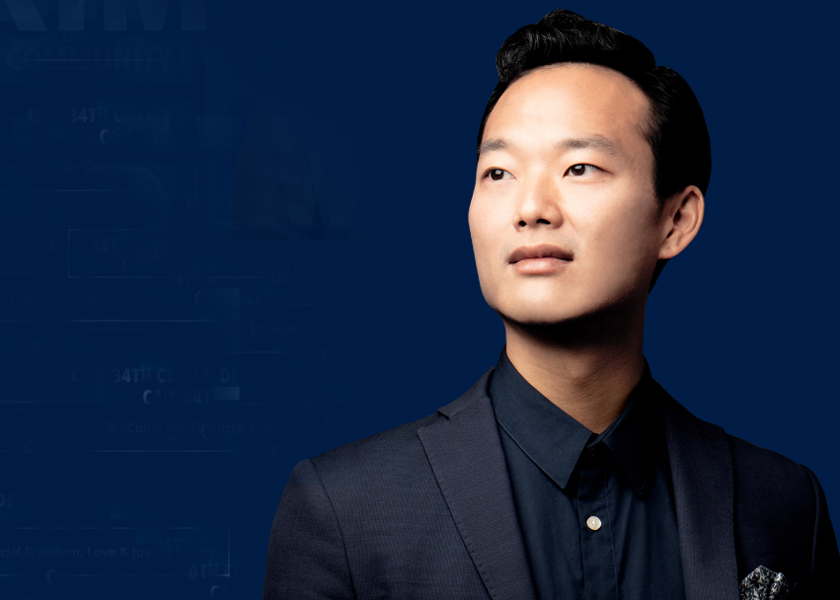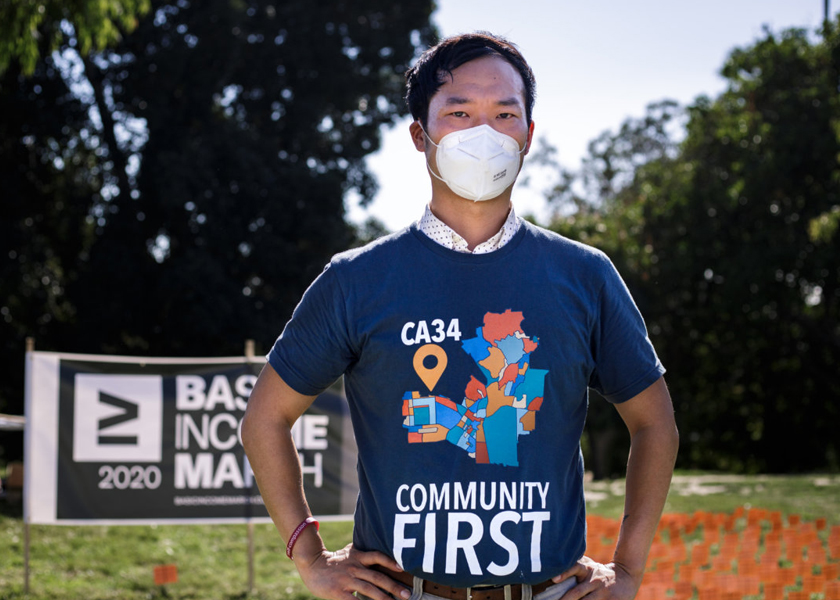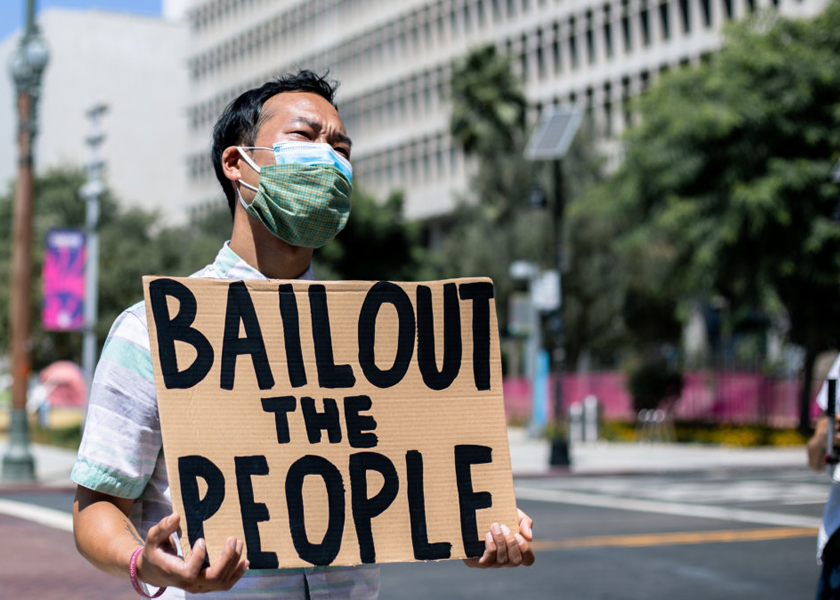In one of the poorest districts, activist David Kim runs for Congress on values forged in the pandemic | By Martha Vickery (Fall 2020 issue)

A Los Angeles lawyer and neighborhood activist is making some waves and running hard for a congressional seat that includes Koreatown and many other ethnic neighborhoods. If elected, David Kim will be the first Korean American to represent this area, ranked as the 10th poorest congressional district in the country.
As a child of a pastor in a Korean church, Kim remembers translating for his immigrant parents, and for many church members. Kim recalls how normal it seemed to him as a kid to be at something like a parent-teacher school conference, “and instead of my parents talking, I would be talking!” His parents would ask him to make calls on behalf of a church member in some sort of predicament “so I would negotiate their car accidents, their phone bills or utility bills – I’d be, like eight years old, interpreting these things in Korean and English.”
Being an advocate on other people’s behalf stuck with him. Going to law school, and learning to represent clients, from K-pop stars to undocumented immigrants, becoming a community council member and community activist is all “just an extension of what I would always do for my mom and dad,” Kim said.
Kim is running against incumbent Democrat Jimmy Gomez, who was elected in 2017. On March 3, Gomez and Kim were the two top vote-getters in a primary of five candidates; a slate of one Republican and four Democrats, including the incumbent. In the 2017 special election to fill the seat of Xavier Becerra (who became attorney general), Gomez beat out another fellow Democrat by getting 59 percent of the vote. Demographically, the 34th district is a mix of roughly 50 percent Latino, 25 percent Asian, 10 percent Black and 15 percent white, and includes numerous ethnic enclaves in addition to Koreatown.

Recognition has been growing that the pandemic has accelerated the urgency of many national issues that were growing for years before March 2020. In Kim’s district, because of poverty combined with high housing costs, these problems have been amplified. Small entrepreneurial businesses have failed, people have lost employment, and with that, their health care. This has prompted Kim to create a platform featuring various types of relief for basic needs. He calls it a “new New Deal,” referring to the program of jobs and benefits crafted by President Franklin Delano Roosevelt at the end of the Depression in 1933.
“Our families are all financially depressed,” he said. “They all have two or three jobs. And so it’s a common story that two parents don’t get to see their children at the same time, because the parents are taking turns to go work.”
In the 34th District, Kim said, “the per-capita income per month is less than the rent of a one-bedroom apartment here.” Not surprisingly, homelessness has become a crisis in Los Angeles, but, Kim said, elected officials have been quiet about it. “Whether local officials, city, county or federal, no one is trying to address the elephant in the room, about there being more than 40,000 people unhoused now in our city, and the lack of affordable housing.” His website lists a statistic that more than 62 percent of Los Angeles residents spend at least 30 percent of their income on rent. An on-line campaign ad shows the view from a car window of one of the many tent cities that has sprung up in recent months.

Recently, the Kim campaign launched a partnership with the start-up financial services company Steady to premiere a trial basic income grant to 25 families for three months. Part of Kim’s platform, endorsed by former presidential candidate Andrew Yang, is to institute universal basic income, which would relieve the pressures of poverty and homelessness of Los Angeles residents, and people in many other cities.
Steady is a service accessed through a phone app, and designed to help gig workers find more work to fit their skills and interests, and help them get financial advice. According to its website, Steady has given away $2.5 million in emergency cash grants to individuals since the pandemic began. As a special project, Steady has agreed to pay for the pilot program, which started at the beginning of October in the 34th District. It will track how an $840 monthly grant will help families who have experienced a significant income loss related to the pandemic.
Los Angeles does not have a real moratorium on eviction, Kim explained. “You have to show certain documentation to prove [your financial situation] is COVID-related.” Starting in September, he said “everyone in LA must pay at least 25 percent of their rent. If they don’t, that can accrue and lead to evictions in March.” Unless the pandemic rapidly improves, along with the city’s economy and availability of jobs, many more LA residents could be homeless by early 2021.
Kim is also looking at the high cost and low effectiveness of policing in Los Angeles. Half of the Los Angeles budget goes to the LA Police Department, Kim said, which he believes is way out of whack. People are “realizing that it is not more policing that makes things safer, it is providing resources to our community… Like if we were able to put some of that money toward education, health care and mental health services,” he said. In addition, Kim’s platform supports Medicare for All and the Green New Deal as well as progressive immigration reform.
In March, the campaign was ready to roll out a six-month strategy when the pandemic happened, and Kim’s team had to quickly adapt to the situation. Instead of traditional appearances, “we switched immediately to community relief efforts,” he said, including food distribution, mutual aid, relief efforts, and dropping off masks and other personal protective equipment (PPE) to people in need. The campaign also provided information resources through text blasts, he said, on where to go for food, or what kind of letter to write to avoid eviction.
One unique campaign offering was a “mokbang,” he said, which, in Korea, is a live internet event where a person videos themselves eating a meal, usually an enormous one. “We had our own mokbang, so each week we featured a different community family-owned restaurant in our LA area,” he said. They chose restaurants that that had had a drop in business of 80 percent or more. Kim and other participants sampled the food on a live video. “We would order a couple menu items and have the owner or manager be on the Zoom livestream, and we would just talk about the restaurant, how long it had been in the community, when it opened, some great menu items to order, and how people can help out the restaurant,” he said.
A later addition to the mokbang was the opportunity for viewers to donate in order to sponsor meals for those in need. “Then we would get 10 to 30 meals at the featured restaurant, and we would distribute them to unhoused neighbors too,” he said.
Kim has run a grassroots-funded campaign, and has railed against his well-funded opponent Jimmy Gomez, accusing him of taking large contributions from corporate special interests. Kim’s grassroots campaign is “totally disruptive to the world of politics in DC, because they can’t blackmail you or pressure you into taking certain stances,” Kim said.
There is a lot of distrust of politics in general in his district, Kim observed. Of 700,000 constituents in the district, 300,000 are voters. However, only about half of that number voted in the last election, according to the website Ballotpedia. “It is unfortunate, but I get it, because you vote for things to change but nothing happens, you get discouraged and jaded and you just don’t want to vote any more,” he said. Sparking voter interest and increasing turnout on November 3 will favor him, Kim believes.
Once elected, Kim said, he will also meet regularly with his constituency about their concerns. The former representative in that seat, Xavier Becerra, had frequent meetings with district constituents; Gomez does not have regular meetings, Kim said. Further, Kim said he wants to sponsor a bill to require U.S. representatives to meet with constituents monthly, and to file the meeting notes in congress.
“I feel our government should be one that’s more representative of the people, so it’s not just career politicians who are always in office, but it’s people from different walks of life, with different stories, different socio-economic statuses, and different backgrounds,” he said. “And that’s what a real representative government looks like. I know this sounds very idealistic, but hey, we are the answer that we are waiting for, so that is why I am stepping up.”
Kim’s campaign website is: DavidKim2020.com


